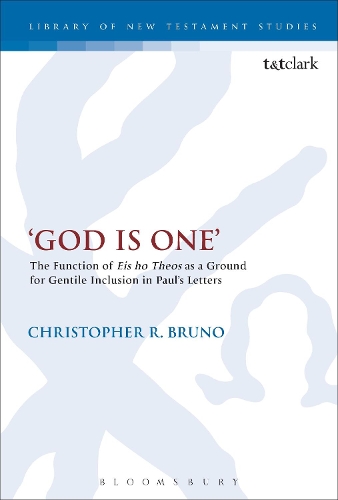
God is One': The Function of 'Eis ho Theos' as a Ground for Gentile Inclusion in Paul's Letters
(Hardback)
Available Formats
Publishing Details
God is One': The Function of 'Eis ho Theos' as a Ground for Gentile Inclusion in Paul's Letters
By (Author) Christopher R. Bruno
Bloomsbury Publishing PLC
T.& T.Clark Ltd
10th October 2013
United Kingdom
Classifications
Tertiary Education
Non Fiction
Criticism and exegesis of sacred texts
New Testaments
227.06
Physical Properties
Hardback
264
Width 156mm, Height 234mm
572g
Description
In discussions of Paul's letters, much attention has been devoted to statements that closely identify Christ with Israel's God (i.e., 1 Cor 8:6). However, in Rom 3:30 and Gal 3:20, Paul uses the phrase "God is one" to link Israel's monotheistic confession and the inclusion of the Gentiles in the people of God. Therefore, this study traces the OT and early Jewish backgrounds of the phrase "God is one" and their possible links to Gentile inclusion. Following this, Christopher Bruno examines the two key Pauline texts that link the confession of God as one with the inclusion of the Gentiles. Bruno observes a significant discontinuity between the consistent OT and Jewish interpretations of the phrase and Paul's use of "God is one" in relation to the Gentiles. In the both the OT and earlyJewish literature, the phrase functions as a boundary marker of sorts, distinguishing the covenant people and the Gentiles. The key exception to this pattern is Zech 14:9, which anticipates the confession of God as one expanding to the nations. Similarly, in Romans and Galatians, the phrase is not aboundary marker, but rather grounds the unity of Jew and Gentile. The contextand arguments in Rom 3:30 and Gal 3:20 lead to the conclusion that Paul's monotheism must now be understood in light of the Christ event; moreover, Zech14:9 may play a significant role in the link between Paul's eschatological monotheism and his argument for the inclusion of the Gentiles in Romans and Galatians.
Reviews
Bruno demonstrates a refreshing combination of exegetical skill and theological sensitivity His clear prose enables the reader to follow what are often detailed and difficult discussions of ancient texts and technical scholarly views. -- Matthew S. Harmon, Grace Theological Seminary * Journal of the Evangelical Theological Society *
Author Bio
Christopher R. Bruno (Ph.D., Wheaton College) is the executive director of the Antioch School Hawaii and pastor for training and discipleship at Harbor Church in Honolulu, Hawaii, USA. He has published articles and reviews in journals such as the Tyndale Bulletin and Vetus Testamentum.
